It’s no secret that Rod Serling co-wrote the screenplay to the original Planet of the Apes in 1968. That was four years after his signature TV series, The Twilight Zone, had left the air.
I’ve heard people talk about the social commentary, twist ending, and other general similarities between Serling’s TV series and this feature film. But I’d like to get into the details and show how six episodes of The Twilight Zone seem to have directly inspired just about every aspect of Planet of the Apes.
Let’s get right to it!
The Rip Van Winkle Caper
 Taylor and his shipmates are on a centuries-long interstellar journey, and they use hypersleep pods to survive long enough to reach their destination. When Taylor and the other two astronauts awaken from hypersleep, they quickly discover that the sole female member of their crew is dead and her body has been rotting for ages.
Taylor and his shipmates are on a centuries-long interstellar journey, and they use hypersleep pods to survive long enough to reach their destination. When Taylor and the other two astronauts awaken from hypersleep, they quickly discover that the sole female member of their crew is dead and her body has been rotting for ages.
 This resembles “The Rip Van Winkle Caper” where four thieves put themselves into suspended-animation chambers for 100 years after pulling off a big gold heist. When they wake up they aren’t sure if any time has really gone by until they see that one of their companions’ chamber was breached and all that’s left of him are his skeletal remains.
This resembles “The Rip Van Winkle Caper” where four thieves put themselves into suspended-animation chambers for 100 years after pulling off a big gold heist. When they wake up they aren’t sure if any time has really gone by until they see that one of their companions’ chamber was breached and all that’s left of him are his skeletal remains.
I Shot an Arrow Into the Air
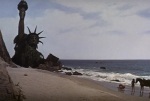 At first, the three astronauts wander through a desert on what they assume is an alien planet light-years from Earth. In the end, only Taylor remains alive and cognizant enough to learn the terrible truth that he has been on Earth the whole time, and humanity has devolved into a primitive race. He breaks down in anger as he gazes upon a ruined Statue of Liberty.
At first, the three astronauts wander through a desert on what they assume is an alien planet light-years from Earth. In the end, only Taylor remains alive and cognizant enough to learn the terrible truth that he has been on Earth the whole time, and humanity has devolved into a primitive race. He breaks down in anger as he gazes upon a ruined Statue of Liberty.
 In the classic episode “I Shot an Arrow Into the Air,” the three surviving astronauts of a rocket launch wander through a desert on what they assume is an asteroid. Distrust and murders ensue until only one man survives long enough to learn that they never left Earth’s atmosphere. He breaks down in tears as he gazes upon telephone poles and a road sign for Reno, Nevada.
In the classic episode “I Shot an Arrow Into the Air,” the three surviving astronauts of a rocket launch wander through a desert on what they assume is an asteroid. Distrust and murders ensue until only one man survives long enough to learn that they never left Earth’s atmosphere. He breaks down in tears as he gazes upon telephone poles and a road sign for Reno, Nevada.
People Are Alike All Over
 Taylor stumbles upon a city full of intelligent gorillas, orangutans, and chimpanzees that have evolved to the point where they can communicate with him in English. They promptly place him in a cage with many other humans who have devolved into mute savages.
Taylor stumbles upon a city full of intelligent gorillas, orangutans, and chimpanzees that have evolved to the point where they can communicate with him in English. They promptly place him in a cage with many other humans who have devolved into mute savages.
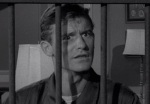 In “People Are Alike All Over,” an astronaut lands on Mars and discovers the Martians look like humans. They can read his thoughts and are thus able to speak to him in English. He is the first human they have encountered, and they put him in a zoo because they consider him to be so inferior to themselves. Coincidentally, the astronaut is played by Roddy McDowall, who would go on to play an ape in Planet of the Apes.
In “People Are Alike All Over,” an astronaut lands on Mars and discovers the Martians look like humans. They can read his thoughts and are thus able to speak to him in English. He is the first human they have encountered, and they put him in a zoo because they consider him to be so inferior to themselves. Coincidentally, the astronaut is played by Roddy McDowall, who would go on to play an ape in Planet of the Apes.
The Obsolete Man
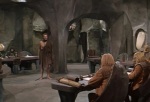 Taylor is put on trial before an ape tribunal that has been convened to decide his fate. The apes grill him over his origins and eventually decide to have him destroyed. But before they do, Taylor manages to escape and captures his prosecutor in an attempt to expose him as a hypocrite and reveal the entire ape society as unjust and backwards.
Taylor is put on trial before an ape tribunal that has been convened to decide his fate. The apes grill him over his origins and eventually decide to have him destroyed. But before they do, Taylor manages to escape and captures his prosecutor in an attempt to expose him as a hypocrite and reveal the entire ape society as unjust and backwards.
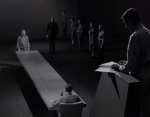 In a dystopian future, a librarian is put on trial before a chancellor for being an “obsolete man.” He is charged with believing in God and is sentenced to death for his crime. He manages to trap the chancellor in a room with him as they wait for a bomb to go off, which will kill them both. He hopes to demonstrate the chancellor’s cowardice and thus the hypocrisy of the society he represents.
In a dystopian future, a librarian is put on trial before a chancellor for being an “obsolete man.” He is charged with believing in God and is sentenced to death for his crime. He manages to trap the chancellor in a room with him as they wait for a bomb to go off, which will kill them both. He hopes to demonstrate the chancellor’s cowardice and thus the hypocrisy of the society he represents.
The Old Man in the Cave
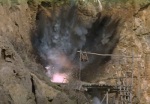 Taylor takes his ape prosecutor into a cave in order to inspect an archaeological dig that had unearthed clues about the apes’ and humans’ past. After they discover undeniable proof that humans used to be highly intelligent, the ape orders the cave to be destroyed. He says he is doing it to save the apes’ civilization.
Taylor takes his ape prosecutor into a cave in order to inspect an archaeological dig that had unearthed clues about the apes’ and humans’ past. After they discover undeniable proof that humans used to be highly intelligent, the ape orders the cave to be destroyed. He says he is doing it to save the apes’ civilization.
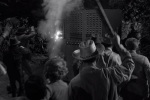 In the aftermath of a nuclear war, the leader of a small town regularly goes to what he describes as an “old man in the cave” to get valuable information that helps his townspeople avoid radioactive food and other serious problems. But the people eventually revolt and run into the cave where they discover the “old man” is actually a computer. They destroy it and seal their fate by eating the radioactive food they had been told not to eat.
In the aftermath of a nuclear war, the leader of a small town regularly goes to what he describes as an “old man in the cave” to get valuable information that helps his townspeople avoid radioactive food and other serious problems. But the people eventually revolt and run into the cave where they discover the “old man” is actually a computer. They destroy it and seal their fate by eating the radioactive food they had been told not to eat.
Eye of the Beholder
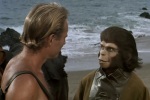 Taylor says goodbye to the ape scientists who helped him escape. He asks to kiss the female ape and she agrees, although before kissing him she exclaims, “But you’re so d@mned ugly!” Taylor then rides away from the apes on a horse with a beautiful woman to an uncertain future in the Forbidden Zone.
Taylor says goodbye to the ape scientists who helped him escape. He asks to kiss the female ape and she agrees, although before kissing him she exclaims, “But you’re so d@mned ugly!” Taylor then rides away from the apes on a horse with a beautiful woman to an uncertain future in the Forbidden Zone.
 In “Eye of the Beholder,” a woman undergoes surgery to fix her deformed face, but the operation fails spectacularly. In the end it is revealed that she is actually a beautiful woman while everyone else is hideously disfigured. She encounters a handsome man who promises to bring her to a group of outcasts who look like her.
In “Eye of the Beholder,” a woman undergoes surgery to fix her deformed face, but the operation fails spectacularly. In the end it is revealed that she is actually a beautiful woman while everyone else is hideously disfigured. She encounters a handsome man who promises to bring her to a group of outcasts who look like her.
Conclusion
Pretty crazy, huh? I suppose it shouldn’t be too surprising. Rod Serling was a brilliant writer, so it only makes sense that he would borrow some of the fantastic ideas from his earlier work for this film. Of the six episodes I listed above, Serling came up with the stories for three of them and wrote the teleplay for the other three.
Of course, the film was based on the 1963 French novel, La Planète des Singes, but it was changed dramatically from the source material during the writing process.
If you haven’t seen those Twilight Zone episodes, I’m sorry for spoiling them for you, but you should still check them out and compare them to Planet of the Apes. Their stories are alike all over.
This is the Deja Reviewer bidding you farewell until we meet again.
All images are the copyright of their respective owners.
Want to Support the Deja Reviewer?
If you’d like to support the Deja Reviewer, please consider donating a few dollars to keep this site going strong. I’ll even send you an original joke if you do! Try it, and prepare to enjoy a good chuckle.
$5.00


I loved the planet of the apes when I was a kid. I had a bit of a crush on one the apes. Which was weird.
LikeLike
Cornelius is quite the gentle-ape. 🙂
I’ve loved this movie since I was a kid, too. It’s just so interesting. I also like Escape from the Planet of the Apes. It’s fun to see the first film play out in reverse.
LikeLike
Yes! It was Cornelius. Those films were a huge part of our childhood and of course there was the TV series as well.
LikeLike
I remember The Eye of the Beholder episode! Great post-I never knew all those Twilight Zone connections.
LikeLiked by 1 person
Thank you. The Twilight Zone is such an awesome show. I even enjoyed the later incarnations of it over the years. Such classic, timeless stories.
It’s really fun to see how well they translated into a film long before Twilight Zone: The Movie in 1983.
LikeLiked by 1 person
Pingback: Everything in Planet of the Apes (1968) came from these 6 Twilight Zone episodes | Reddit Spy
Per Eyes of the Beholder, I would throw out that there was also a Night Gallery episode about a hideously deformed man who is somehow chosen to be a representative of Earth for a citizen swap with an alien race.
Spoiler: At the moment of exchange, he passes a handsome surfer-looking guy in the space ship hallway (and the guy makes some sort of snide comment like, “Great! More of the same!”) and is momentarily depressed only to find himself greeted by a bevy of nurses who look hideous just like he does and they all seem smitten with his looks.
LikeLike
I’ve only seen a couple episodes of Night Gallery, but that definitely sounds like an interesting connection. Crazy stuff. Thank you for mentioning it.
LikeLike
I’m second to none in my admiration of Night Gallery (heck, that’s a pic of Serling on NG in my avatar), but the episode you’re talking about, “The Different Ones,” was pretty poor. Even Serling, who wrote it, wound up disowning it. It makes a similar point to “Eye of the Beholder,” yes, but not nearly as effectively, IMO.
But hmmm, you mention the ending, and I will say this: At least “The Different Ones” has a happy one!
LikeLike
Pingback: Everything in Planet of the Apes (1968) Came from These 6 Twilight Zone Episodes | FilmmakerIQ.com
Pingback: Everything in Planet of the Apes (1968) Came from These 6 Twilight Zone Episodes | roberto cimatti
Pingback: Everything in Planet of the Apes (1968) Came from These 6 Twilight Zone Episodes | Blutterbunged
Reblogged this on Shadow & Substance and commented:
I have yet to do a post on “Planet of the Apes,” but I couldn’t help sharing this look at how its plot points can be traced back to six specific Twilight Zone episodes. Spoilers abound, of course, but if you’ve seen them all, it’s an intriguing theory. Enjoy!
LikeLike
Pingback: Mary Poppins, The Twilight Zone, and the Epidemic of Male Suicide | Deja Reviewer
This article shows a remarkable lack of knowledge of the topic being discussed. Rod Serling did write a POTA film script, yes–but the one used for the movie was by Michael Wilson. Rod Serling’s version was rejected. And much of what this article discusses was added by Wilson, not Serling. So, no, none of these aspects came from The Twilight Zone.
LikeLike
Pingback: Welcome and Merry Christmas | Deja Reviewer
I liked Mr. Lockhard’s article, given my fondness for the Twilight Zone series, the 1968 Planet of the Apes movie, and the novel by Pierre Boulle. I don’t agree with the dismissive comment by “Dandru.” From what I’ve read, Serling’s work and treatment weren’t totally erased by Michael Wilson’s script (see the online article “Rod Serling’s Planet of the Apes script metamorphosis”).
LikeLike
P.S. My apologies for misspelling Mr. Lockard’s name.
LikeLike
No worries. I appreciate your comment and the fact that you noticed that little detail about my name. I get that misspelling quite a bit. 🙂
LikeLike
Pingback: Sequels That Show What Happened Right After the First Film’s End Credits Rolled | Deja Reviewer
Pingback: Why Does The Twilight Zone Hold Up So Well? | Deja Reviewer
Pingback: Além da Imaginação Podcast: S01E25 People Are Alike All Over • Masmorra Cine
Pingback: Can You Imagine Seeing a TV Episode Like This Today? | Deja Reviewer
Pingback: Além da Imaginação Podcast: S01E25 People Are Alike All Over | Masmorra Cine
Pingback: Independence Day Paradoxically Appeals to Disparate Worldviews | Deja Reviewer
Pingback: Além da Imaginação Podcast: S01E25 People Are Alike All Over – Além da Imaginação Podcast
Very nice ppost
LikeLiked by 1 person